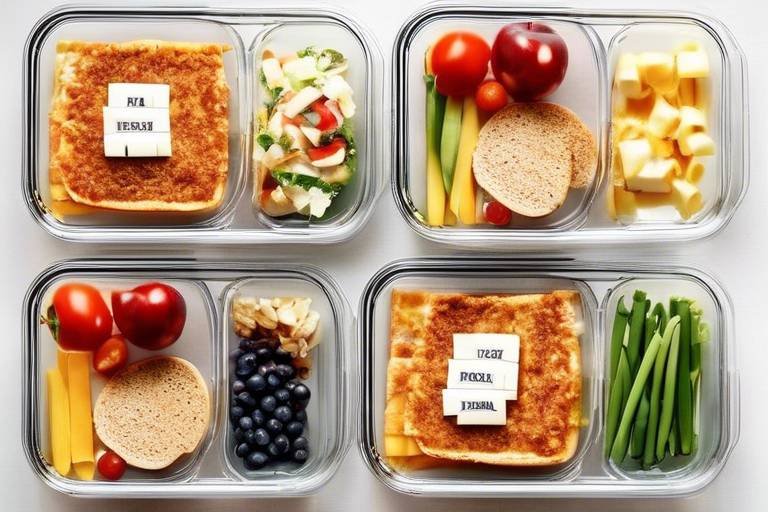The Right Way to Use Supplements for Kids
In today’s fast-paced world, ensuring that our children receive the right nutrients can sometimes feel like a daunting task. With the rise of fast food, busy schedules, and picky eaters, many parents find themselves pondering, "Are my kids getting enough vitamins and minerals?" This article dives into the appropriate use of dietary supplements for children, emphasizing safety, necessity, and providing guidelines for parents to ensure their kids receive the right nutrients for healthy growth.
Children have unique nutritional requirements that change as they grow. From toddlers to teenagers, their bodies are constantly developing, and so are their needs. Essential vitamins and minerals such as calcium, vitamin D, iron, and omega-3 fatty acids play a crucial role in this growth. For instance, calcium is vital for building strong bones, while iron is necessary for cognitive development. Supplements can be a helpful way to fill in the gaps when a child’s diet may not provide all the nutrients they need. However, it’s essential to understand that supplements are not a replacement for a balanced diet; rather, they should be viewed as a helpful addition.
Not every child requires supplements, and it’s important for parents to assess their child's specific situation. Here are some scenarios where supplementation may be beneficial:
- Dietary Restrictions: Children with food allergies or intolerances may miss out on essential nutrients.
- Health Conditions: Certain medical conditions can affect nutrient absorption, making supplements necessary.
- Picky Eating: If your child is a selective eater, they might not be getting a well-rounded diet.
In these cases, supplements can help bridge the nutritional gaps, but it’s crucial to approach supplementation thoughtfully and with guidance.
Recognizing the signs of nutrient deficiencies in children is vital for their overall health. Symptoms can be subtle and may include fatigue, irritability, frequent illnesses, or poor concentration. If you notice any of these signs, it may be time to evaluate your child’s diet and consider whether supplements could be beneficial. Early identification is key, and parents should be vigilant about their child’s health and dietary habits.
Some vitamins and minerals are more frequently deficient in children. Here are a few common ones:
| Nutrient | Common Symptoms of Deficiency | Potential Health Impacts |
|---|---|---|
| Vitamin D | Weak bones, fatigue | Rickets, osteoporosis |
| Iron | Fatigue, pale skin | Anemia, cognitive delays |
| Calcium | Weak teeth, muscle cramps | Bone health issues |
By understanding these deficiencies, parents can make informed decisions about whether supplements are necessary.
Before starting any supplement regimen, consulting a healthcare professional is essential. Pediatricians or nutritionists can provide personalized guidance based on your child's health history and dietary needs. They can help determine if supplements are necessary and recommend the right types and dosages. It’s always better to err on the side of caution when it comes to your child’s health.
With a plethora of options available on the market, selecting the right supplements can be overwhelming. Here are some tips to help you navigate this process:
- Look for high-quality brands that have undergone third-party testing.
- Choose age-appropriate supplements tailored to your child's specific needs.
- Check for added sugars and artificial ingredients.
By being discerning in your choices, you can ensure that your child receives the best possible supplements to support their health.
Understanding safe dosage is crucial to avoid potential toxicity. The right dosage often depends on a child's age and weight. As a general rule, always follow the recommendations on the supplement label or those provided by a healthcare professional. Here’s a quick overview:
| Age Group | Recommended Daily Allowance (RDA) |
|---|---|
| 1-3 years | Varies by nutrient |
| 4-8 years | Varies by nutrient |
| 9-13 years | Varies by nutrient |
By adhering to these guidelines, parents can safely administer supplements to their children.
Like any medication or supplement, side effects can occur. Common adverse reactions may include gastrointestinal upset, allergic reactions, or interactions with other medications. It’s essential to monitor your child for any negative effects after starting a new supplement and consult a healthcare professional if any concerning symptoms arise.
Supplements should complement a balanced diet, not replace it. Encourage your child to eat a variety of foods rich in nutrients, such as fruits, vegetables, whole grains, and lean proteins. Integrating supplements into a child's daily routine can be as simple as adding a chewable vitamin to their breakfast or incorporating a powdered supplement into a smoothie. The goal is to create a holistic approach to nutrition that supports their growth and health.
Q: Are supplements necessary for all children?
A: Not all children require supplements. It depends on their dietary habits and specific health needs. Always consult a healthcare professional for guidance.
Q: Can too many supplements be harmful?
A: Yes, excessive intake of certain vitamins and minerals can lead to toxicity. It’s crucial to adhere to recommended dosages.
Q: How can I ensure my child is getting enough nutrients?
A: Focus on providing a balanced diet rich in fruits, vegetables, whole grains, and lean proteins, and consider supplements if necessary.

Understanding Nutritional Needs
When it comes to children's health, understanding their unique nutritional needs is absolutely essential. Kids are growing at an astonishing rate, and their bodies require a variety of nutrients to support everything from their bones to their brains. Just like a car needs fuel to run, children need the right vitamins and minerals to thrive. But what exactly do they need?
Generally, children require a balanced intake of macronutrients—carbohydrates, proteins, and fats—as well as micronutrients like vitamins and minerals. Each age group has different requirements, so it’s crucial to tailor their diets accordingly. For instance, toddlers may need more iron for their developing brains, while teenagers might require additional calcium for their growing bones. Here’s a closer look at some essential nutrients:
| Nutrient | Importance | Sources |
|---|---|---|
| Calcium | Critical for bone growth and density | Dairy products, leafy greens, fortified foods |
| Iron | Supports cognitive development and energy levels | Red meat, beans, spinach, fortified cereals |
| Vitamin D | Essential for calcium absorption and bone health | Sunlight, fatty fish, fortified milk |
| Vitamin A | Important for vision and immune function | Carrots, sweet potatoes, spinach |
While most kids can get these nutrients through a well-rounded diet, there are times when supplements can play a role. For example, if a child is a picky eater or has a restricted diet due to allergies or other health conditions, they may not be getting all the nutrients they need. In these cases, supplements can serve as a safety net, helping to fill in nutritional gaps.
However, it’s important to remember that supplements should never replace a healthy diet. Think of them as a backup plan—a little extra support when things aren’t going as planned. A diet rich in fruits, vegetables, whole grains, and lean proteins should always be the primary focus. Parents should aim to provide a variety of foods to ensure their children receive the necessary nutrients for optimal growth and development.
As you navigate your child’s nutritional needs, keep in mind that every child is different. Their growth patterns, activity levels, and even genetic factors can influence their nutrient requirements. Therefore, it’s always a good idea to consult with a healthcare professional if you’re unsure about your child’s dietary needs or if you’re considering adding supplements to their routine.

When to Consider Supplements
When it comes to our little ones, ensuring they receive the right nutrients is a top priority for every parent. However, the question arises: when should we consider adding supplements to their diet? Not every child requires supplements, but there are specific scenarios where they can be beneficial. For instance, if your child has dietary restrictions due to allergies or intolerances, they may miss out on essential vitamins and minerals. Imagine a child who is lactose intolerant; they might struggle to get enough calcium, which is crucial for bone development. In such cases, a calcium supplement could be a viable option to fill that nutritional gap.
Another situation that might warrant supplementation is when children have health conditions that affect their ability to absorb nutrients. For example, children with gastrointestinal disorders might not be able to absorb nutrients effectively from their food. If your child falls into this category, consulting with a healthcare professional about the need for supplements becomes essential. Additionally, picky eaters often present a challenge. If your child prefers a limited range of foods, the chances of missing out on vital nutrients increase significantly. In these scenarios, supplements can serve as a safety net, ensuring that children receive the necessary nutrients for their growth and development.
It's also worth noting that some children are simply more active than others, burning through energy and nutrients at a faster rate. If your child is involved in sports or other physically demanding activities, they might require additional vitamins and minerals to support their energy levels and recovery. Think of it as fueling a race car; just as a car needs the right fuel to perform at its best, your child needs adequate nutrition to thrive in their daily activities.
However, it's crucial to approach supplementation thoughtfully. Not all supplements are created equal, and some can even be harmful if misused. Before jumping into the world of vitamins and minerals, it's important to assess your child's diet and lifestyle. You might want to keep a food diary to track what they eat over a week or two. This can help identify any potential deficiencies and provide a clearer picture of whether supplements are necessary. Remember, supplements should not be seen as a replacement for a well-balanced diet, but rather as an addition when needed.
In summary, consider supplementation if your child:
- Has dietary restrictions or allergies.
- Struggles with picky eating habits.
- Has health conditions affecting nutrient absorption.
- Is very active and may need extra nutrients.
Ultimately, the best course of action is to consult with a healthcare professional who can provide personalized guidance based on your child's specific needs. They can help determine whether supplements are necessary and, if so, which ones would be the most beneficial.
1. Are all supplements safe for children?
While many supplements are safe, it's crucial to choose high-quality products and consult a healthcare professional before starting any regimen.
2. How can I tell if my child needs supplements?
Look for signs of nutrient deficiencies, such as fatigue, poor concentration, or unusual cravings. Keeping a food diary can also help identify gaps in their diet.
3. Can supplements replace a healthy diet?
No, supplements should complement a healthy diet, not replace it. A well-balanced diet is essential for overall health.
4. What are the most common deficiencies in children?
Common deficiencies include vitamin D, calcium, iron, and omega-3 fatty acids, often due to dietary restrictions or picky eating habits.

Signs of Nutrient Deficiency
Recognizing the in children is crucial for their overall health and development. Kids are growing rapidly, and their bodies require a variety of nutrients to support this growth. If a child is not getting enough of essential vitamins and minerals, it can lead to various health issues. But how can parents identify these deficiencies? Well, there are several common symptoms to watch out for that may indicate a lack of specific nutrients.
For instance, if your child is frequently feeling tired or sluggish, it may be a sign of iron deficiency, which is quite common among children. Iron is essential for producing hemoglobin, which helps carry oxygen in the blood. Other signs to look for include:
- Unusual cravings: If your child is craving non-food items (like dirt or chalk), it could indicate a deficiency in minerals like iron or zinc.
- Frequent infections: A weakened immune system can often be a sign of vitamin deficiencies, particularly vitamins A, C, and D.
- Skin issues: Dry, flaky skin or rashes may suggest a lack of essential fatty acids or vitamins like E.
- Behavioral changes: Irritability or mood swings can sometimes be linked to deficiencies in B vitamins, particularly B12 and folate.
It's important to remember that these signs can vary widely from one child to another, and they may not always point to a nutrient deficiency. However, if you notice any of these symptoms persisting, it’s wise to consult a healthcare professional. They can provide a comprehensive evaluation and recommend appropriate testing if necessary.
Moreover, understanding the specific nutrients that are commonly deficient in children can help parents be more proactive. For example, vitamin D is essential for bone health, and many children do not get enough due to limited sun exposure, especially in colder months. Similarly, calcium is vital for developing strong bones and teeth, and a lack of it can lead to long-term health issues.
In summary, being vigilant about your child’s health can help you catch any potential nutrient deficiencies early on. By observing their behavior, energy levels, and physical health, you can play a crucial role in ensuring they receive the nutrition they need for a healthy, active life.
Q: How can I tell if my child needs supplements?
A: Look for signs of nutrient deficiency such as fatigue, unusual cravings, or frequent infections. If you notice these symptoms, consult a healthcare professional.
Q: Are all supplements safe for children?
A: Not all supplements are appropriate for children. It's essential to choose age-appropriate supplements and consult a healthcare professional before starting any regimen.
Q: Can a balanced diet provide all the nutrients my child needs?
A: In many cases, a well-balanced diet can meet a child's nutritional needs. However, certain dietary restrictions or picky eating habits may necessitate supplements.

Common Deficiencies in Kids
When it comes to children's health, ensuring they receive the right nutrients is crucial. Unfortunately, many kids face nutrient deficiencies that can impact their growth, development, and overall well-being. Some of the most common deficiencies include vitamin D, iron, calcium, and vitamin B12. Each of these nutrients plays a significant role in a child's health, and a lack of them can lead to various health issues.
For instance, vitamin D is essential for bone health, as it helps the body absorb calcium. A deficiency in vitamin D can lead to conditions like rickets, which is characterized by weak or soft bones. Children who do not get enough sunlight exposure or consume fortified foods may be at risk. Similarly, iron is vital for producing hemoglobin, the protein in red blood cells that carries oxygen. Without adequate iron, children may experience fatigue, weakness, and developmental delays.
Calcium is another nutrient that is often lacking in children's diets. It's crucial for building strong bones and teeth. Insufficient calcium intake during childhood can lead to osteoporosis later in life. Lastly, vitamin B12 is essential for brain development and the formation of red blood cells. A deficiency can cause neurological issues and anemia, particularly in children who follow a vegetarian or vegan diet.
To help parents understand the importance of addressing these deficiencies, here’s a quick overview of the common deficiencies and their potential impacts:
| Nutrient | Common Sources | Potential Impact of Deficiency |
|---|---|---|
| Vitamin D | Sunlight, fortified milk, fatty fish | Weak bones, rickets |
| Iron | Red meat, beans, fortified cereals | Fatigue, developmental delays |
| Calcium | Dairy products, leafy greens, fortified juices | Weak bones, osteoporosis |
| Vitamin B12 | Meat, dairy, eggs | Neurological issues, anemia |
Recognizing these common deficiencies is the first step in ensuring that children receive the nutrients they need for healthy growth. Parents should be vigilant and consider consulting a healthcare professional if they suspect their child may be lacking in any of these essential vitamins and minerals. By being proactive, parents can help their children thrive and reach their full potential.
1. How can I tell if my child has a nutrient deficiency?
Look for signs such as fatigue, irritability, or physical symptoms like pale skin. A healthcare professional can perform tests to confirm deficiencies.
2. Are supplements safe for children?
When used appropriately and under the guidance of a healthcare provider, supplements can be safe. However, it's essential to avoid excessive dosages.
3. How can I encourage my child to eat a balanced diet?
Involve them in meal planning and preparation, offer a variety of foods, and make healthy eating fun and engaging.
4. What should I do if my child is a picky eater?
Consult a pediatrician or nutritionist for tailored advice. They may recommend specific supplements to fill any gaps in nutrition.

Consulting Healthcare Professionals
When it comes to the health and well-being of our children, is not just a good idea; it’s essential. Parents often find themselves in a maze of information regarding dietary supplements, and the stakes are high. After all, you want to ensure that your little ones are not only getting the right nutrients but also doing so safely. So, how do you navigate this complex landscape? The first step is to reach out to a pediatrician or a registered dietitian who specializes in children’s nutrition. These professionals can provide tailored advice based on your child’s unique health profile, dietary habits, and nutritional needs.
One of the primary reasons to consult a healthcare professional is to determine whether your child truly needs supplements. Not all children require additional vitamins or minerals; some may receive sufficient nutrients from a well-balanced diet. A pediatrician can perform assessments, including blood tests, to check for any deficiencies and guide you on the right course of action. For instance, if your child is a picky eater, a healthcare professional can suggest specific supplements that might help fill in the gaps without overwhelming your child with unnecessary options.
Moreover, healthcare professionals can help you understand the potential interactions between supplements and any medications your child may be taking. This is particularly important because some supplements can interfere with the effectiveness of prescribed medications. For example, iron supplements can affect the absorption of certain antibiotics, making it crucial to time their intake correctly. By consulting a healthcare provider, you can avoid these pitfalls and ensure a safe supplement regimen.
Another critical aspect is dosage. Children are not just small adults; their bodies metabolize substances differently. A healthcare professional can provide guidelines on the appropriate dosages for specific age groups and health conditions, ensuring that your child receives the benefits of supplements without the risks of toxicity. For example, while vitamin D is vital for bone health, excessive amounts can lead to serious health issues. A pediatrician will help you navigate these waters, ensuring that your child’s supplement intake is both safe and effective.
In conclusion, while the world of dietary supplements can seem daunting, consulting healthcare professionals can provide clarity and peace of mind. They serve as your trusted partners in ensuring that your child gets the right nutrients in the safest way possible. So, before you start adding anything to your child's diet, take a moment to reach out to a healthcare provider. It’s a small step that can make a world of difference in your child's health journey.
- What types of supplements are safe for children? Always consult a healthcare professional for personalized recommendations, but common supplements include multivitamins, vitamin D, and omega-3 fatty acids.
- How do I know if my child needs supplements? Signs of nutrient deficiencies, dietary restrictions, or health conditions may indicate a need for supplements. A healthcare provider can conduct assessments.
- Can supplements replace a healthy diet? No, supplements are meant to complement a balanced diet, not replace it. Focus on providing a variety of nutrient-rich foods.
- What are the risks of giving my child too many supplements? Over-supplementation can lead to toxicity and health issues. Always follow dosage guidelines provided by healthcare professionals.

Choosing the Right Supplements
When it comes to for your child, the process can feel a bit like navigating a maze. With shelves stocked full of colorful bottles and flashy labels, it's easy to get overwhelmed. But fear not! Making informed decisions is key to ensuring your little ones get the nutrients they need without any unnecessary additives or fillers. First and foremost, it’s crucial to look for supplements that are specifically designed for children. These products typically contain the right balance of vitamins and minerals tailored to their unique developmental needs.
One of the best ways to start is by examining the ingredient list. Look for supplements that are free from artificial colors, flavors, and preservatives. A good supplement should also be easy to digest and absorb, which is especially important for kids who may have sensitive stomachs. Additionally, consider the form of the supplement. Some children may prefer chewable tablets, while others might enjoy gummies or liquid forms. The key is to find something that your child will actually take without a fuss.
Moreover, it’s essential to pay attention to the dosage. Always follow the recommended guidelines on the label, which are typically based on age. For instance, a multivitamin designed for toddlers may have a different dosage than one made for older children. If you're ever in doubt, consulting a healthcare professional can provide clarity and ensure you're making the best choice for your child's health.
Another important factor is to check for third-party testing. Reputable brands often have their products tested by independent organizations to verify their quality and purity. This means you can trust that what’s on the label is actually in the bottle. Safety first, right? Keep an eye out for certifications from organizations like the U.S. Pharmacopeia (USP) or NSF International, which can give you peace of mind.
Lastly, consider your child's specific dietary needs. If your child follows a vegetarian or vegan diet, for example, they may require additional sources of certain nutrients like vitamin B12 or iron. In such cases, look for supplements that cater specifically to these dietary restrictions. It's all about finding the right fit for your child's lifestyle and nutritional requirements.
In summary, choosing the right supplements for your child involves a blend of careful consideration, research, and sometimes a little trial and error. Remember, supplements should complement a healthy diet, not replace it. By focusing on high-quality products and being mindful of your child's individual needs, you can help support their growth and development in a safe and effective way.
- What should I look for when choosing a supplement for my child? Look for age-appropriate supplements with natural ingredients, free from artificial additives, and preferably third-party tested.
- Are gummy vitamins as effective as regular vitamins? Gummy vitamins can be effective but often contain added sugars. It's important to check the nutritional content and ensure they meet your child's needs.
- How do I know if my child needs supplements? If your child has a restricted diet, health issues, or shows signs of nutrient deficiency, it may be beneficial to consult a healthcare professional.
- Can too many vitamins be harmful? Yes, excessive intake of certain vitamins and minerals can lead to toxicity. Always adhere to recommended dosages and consult with a healthcare provider if unsure.

Safe Dosage Guidelines
When it comes to giving supplements to children, understanding the is crucial. Just like how you wouldn't give a toddler the same amount of medicine as an adult, the same principle applies to supplements. Each child's needs vary based on their age, weight, and overall health. Therefore, it's essential for parents to be well-informed about the appropriate dosages to ensure safety and effectiveness.
Generally, dosage recommendations are often based on the recommended dietary allowances (RDAs) established by health organizations. For instance, vitamins such as Vitamin A, D, and C, along with minerals like calcium and iron, have specific guidelines that parents should follow. To help you understand these guidelines better, here's a simple table that outlines some common vitamins and their recommended dosages for children:
| Vitamin/Mineral | Age Group | Recommended Daily Allowance (RDA) |
|---|---|---|
| Vitamin A | 1-3 years | 300 mcg |
| Vitamin D | 1-3 years | 600 IU |
| Calcium | 4-8 years | 1,000 mg |
| Iron | 4-8 years | 10 mg |
It's important to note that these values can vary based on individual health needs and dietary restrictions. Therefore, keeping an open line of communication with your child's healthcare provider is vital. They can help you tailor the right dosage based on your child's unique circumstances.
Moreover, when introducing any supplement, start with the lowest effective dose. This approach allows you to monitor how your child reacts to the supplement, minimizing the risk of side effects. If you notice any unusual behavior or symptoms after starting a new supplement, it’s best to consult a healthcare professional immediately.
Another aspect to consider is the form of the supplement. Children may have preferences for gummies, chewables, or liquid forms. While gummies may be appealing to kids, they can sometimes contain added sugars or other ingredients that parents might want to avoid. Always read labels carefully and choose products that are free from unnecessary additives.
In summary, adhering to safe dosage guidelines is essential for maintaining your child's health. By being informed and cautious, you can ensure that the supplements you choose support your child's growth and development without compromising their safety.
- What should I do if I accidentally give my child too much of a supplement? If you suspect an overdose, contact your child's healthcare provider or poison control immediately.
- Are all supplements safe for children? Not all supplements are suitable for children. Always consult a healthcare professional before starting any new supplement.
- Can I give my child multiple supplements at once? It's important to be cautious. Some vitamins and minerals can interact negatively, so consult with a healthcare provider for advice.

Potential Side Effects
When it comes to giving your child dietary supplements, it’s crucial to remember that just like any medication, these products can have . While many supplements are generally considered safe, they can still cause adverse reactions in some children. The key is to be vigilant and informed. For instance, some kids may experience gastrointestinal issues such as nausea, vomiting, or diarrhea after taking certain vitamins or minerals. This is particularly common with iron supplements, which can be harsh on a child's digestive system.
Moreover, overconsumption of specific vitamins, especially fat-soluble ones like A, D, E, and K, can lead to toxicity. For example, excessive vitamin A can cause headaches, dizziness, and even liver damage. That’s why it’s essential to adhere to recommended dosages based on your child's age and weight. To help parents navigate this, here’s a quick reference table:
| Supplement | Recommended Daily Allowance (RDA) | Potential Side Effects of Overconsumption |
|---|---|---|
| Vitamin A | 900 mcg (boys), 700 mcg (girls) | Headaches, dizziness, liver damage |
| Vitamin D | 600 IU | Nausea, vomiting, weakness |
| Iron | 7 mg (ages 1-3), 11 mg (ages 4-8) | Constipation, nausea, abdominal pain |
It's also important to note that some children may have allergic reactions to certain ingredients in supplements. For instance, additives like artificial colors or preservatives can trigger sensitivities. Always check the label for any potential allergens, especially if your child has a history of allergies. If you notice any unusual symptoms after starting a supplement, it’s best to stop immediately and consult a healthcare professional.
Monitoring your child for side effects is not just about being reactive; it’s also about being proactive. Regularly discussing your child’s health with a pediatrician can help you stay ahead of any issues. Remember, the goal of supplementation is to support your child's health, not compromise it. So, if you ever feel uncertain about a supplement's appropriateness or safety, don’t hesitate to reach out for expert advice!
- What should I do if my child experiences side effects from a supplement? - Discontinue use immediately and consult your healthcare provider.
- Are natural supplements safer than synthetic ones? - Not necessarily; natural supplements can also cause side effects. Always check for quality and dosage.
- How can I tell if my child needs supplements? - Look for signs of nutrient deficiencies and consult a healthcare professional for personalized advice.

Integrating Supplements with Diet
When it comes to ensuring that our kids get all the nutrients they need for healthy growth, integrating supplements into their diet can feel a bit like solving a puzzle. You want to make sure each piece fits perfectly without overshadowing the others. It's essential to remember that while supplements can be beneficial, they should never replace a well-balanced diet. Think of a supplement as a safety net—there to catch your child if their diet falls short, but not the primary source of nutrition.
To effectively integrate supplements into your child's daily routine, consider these practical tips:
- Consult First: Always start with a chat with your pediatrician or a nutritionist. They can help you understand which supplements, if any, are necessary based on your child's dietary habits and health needs.
- Timing is Key: Try to give supplements at a time when your child is most receptive to taking them. For instance, pairing a multivitamin with breakfast can be a great way to ensure they remember to take it.
- Mix and Match: If your child is a picky eater, consider adding powdered supplements into smoothies or yogurt. This way, they get the nutrients without even realizing it!
Moreover, creating a routine around supplement intake can help make it a natural part of your child's day. For instance, if they take their vitamins right after brushing their teeth, it becomes a habit that they won't forget. You could even let them pick a fun, colorful container for their supplements to make the experience more exciting. After all, who doesn’t love a bit of personalization?
To illustrate how supplements can complement a balanced diet, let’s take a look at a simple table that outlines how various food sources can work alongside common supplements:
| Vitamin/Mineral | Food Sources | Supplement Option |
|---|---|---|
| Vitamin D | Fatty fish, fortified milk, sunlight | Vitamin D3 drops |
| Iron | Red meat, spinach, beans | Iron gummies |
| Calcium | Dairy products, leafy greens, almonds | Calcium chewables |
| Omega-3 Fatty Acids | Fish, walnuts, flaxseeds | Fish oil capsules |
It's crucial to balance the intake of supplements with whole foods. Supplements should fill in the gaps, not serve as a primary source of nutrition. For instance, if your child enjoys yogurt and fruits but is not fond of fish, a good-quality fish oil supplement can help provide those essential omega-3 fatty acids that are vital for brain development. This way, you’re not only ensuring they receive their nutrients but also respecting their preferences, which is a win-win!
Finally, keep an eye on how your child responds to the supplements. Are they feeling more energetic? Are they more focused in school? These are positive indicators that the supplements might be working in harmony with their diet. However, if you notice any adverse reactions, it's essential to reassess and consult with a healthcare professional. Remember, the goal is to support their health and well-being, not to overwhelm their system.
Q: Can I give my child multiple supplements at once?
A: It's best to consult with a healthcare professional before combining multiple supplements to avoid any potential interactions or overdoses.
Q: Are gummy vitamins as effective as regular vitamins?
A: Gummy vitamins can be effective, but they often contain added sugars. Always check the label to ensure they meet your child's nutritional needs.
Q: How can I encourage my child to take their supplements?
A: Make it fun! Let them choose their favorite flavor or shape, and incorporate it into a daily routine to help them remember.
Frequently Asked Questions
- What are the essential nutrients children need for healthy growth?
Children require a variety of vitamins and minerals to support their growth and development. Key nutrients include calcium for strong bones, iron for healthy blood, vitamin D for immune function, and omega-3 fatty acids for brain development. A balanced diet rich in fruits, vegetables, whole grains, and proteins usually provides these nutrients, but sometimes supplements may be necessary.
- When should I consider giving my child supplements?
Supplements may be beneficial in certain situations, such as if your child has dietary restrictions (like vegetarianism), health conditions that affect nutrient absorption, or if they are picky eaters who may not get enough nutrients from their food. Always assess your child's diet first and consult a healthcare professional before starting any supplements.
- What are some signs of nutrient deficiency in children?
Watch for symptoms like fatigue, irritability, frequent infections, and poor growth. Other signs can include pale skin (which may indicate iron deficiency) or dental issues (which can relate to calcium or vitamin D deficiencies). Identifying these signs early can help you take action before they lead to more significant health issues.
- How do I choose the right supplements for my child?
Choosing the right supplements can be daunting. Look for products specifically formulated for children's needs, ensuring they are age-appropriate and free from unnecessary additives. Always check for third-party testing to confirm quality and safety. It’s also wise to discuss your choices with a pediatrician or nutritionist.
- What are the safe dosage guidelines for children's supplements?
Safe dosage varies by age and weight, so it’s crucial to follow the recommended guidelines on the supplement label. Generally, it's best to start with the lowest recommended dose and monitor your child for any side effects. Consulting a healthcare provider can provide personalized recommendations based on your child’s specific needs.
- Can supplements cause side effects in children?
Yes, like any medication, supplements can have side effects. Common reactions might include digestive issues, headaches, or allergic reactions. If you notice any unusual symptoms after starting a supplement, it’s essential to consult with a healthcare professional to determine if the supplement is suitable for your child.
- How can I integrate supplements into my child's diet?
Supplements should complement a balanced diet, not replace it. You can incorporate them into meals by mixing powders into smoothies or giving chewable vitamins as a treat. Encourage your child to maintain a nutritious diet rich in whole foods while using supplements to fill in any gaps.



















